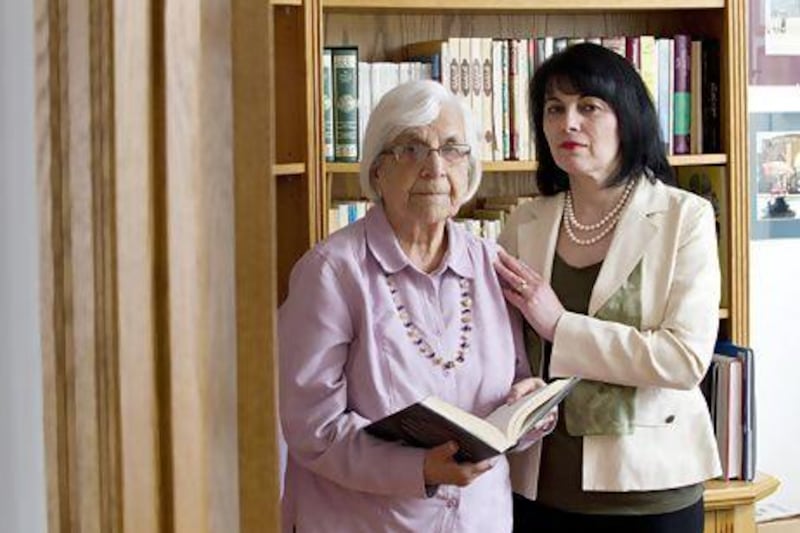TEL AVIV // In December 1948, eight months after the start of the war that created Israel, Khalil Beidas locked the door to his Jerusalem home's library, a three-metre-high, floor-to-ceiling collection of more than 6,000 books that had been his most prized asset.
The 75-year-old prominent Palestinian intellectual then escaped to Lebanon, where he died less than a year later - partly, his grandson says, because of the emotional pain from the loss of his library.
Amid the battles in Jerusalem, Hagop Melikian, an Armenia-born Palestinian businessman, also fled along with his wife from their apartment. He left a private library with dozens of books, including a German-translated complete set of Shakespeare plays and a 19th-century German encyclopaedia, through which he would not flip again. The tens of thousands of books owned before the war by wealthy Palestinian families like those of Beidas and Melikian is only a sliver of what Palestinians lost when they were forced to flee what is now Israel.
Still, the issue of the books' whereabouts has gained controversy after a 2011 revelation by an Israeli researcher that about 6,000 books that had belonged to the Palestinian cultural elite living in West Jerusalem before the 1948 war are languishing in the basement of the National Library of Israel in Jerusalem and marked "abandoned property".
The discovery was followed last year by a documentary, The Great Book Robbery, which charged that the "plunder" of private Palestinian libraries by Israeli librarians in the war's aftermath helped destroy the then-vibrant Palestinian cultural renaissance.
Now, Palestinian activists are making a legal bid to get the books back. Palestinian history experts like Mahmoud Yazbak of Israel's Haifa University say their return could significantly shed light on the pre-war Palestinian intellectual awakening that had been centred in Jerusalem.
"Jerusalem was the Palestinian intellectual and cultural capital of that time," said Mr Yazbak. "Most of Palestine's cultural heritage was lost along with their houses. The loss is very big, much more than we could ever imagine."
Following the 1948 war, a race began for the private possessions of about 28,000 Palestinians who had lived in West Jerusalem - at the time one of the region's wealthiest communities. Competing against the widespread looting of Palestinian homes that was taking place throughout Israel, librarians rushed to collect 30,000 mostly Arabic books from the houses of Jerusalem's prominent Palestinian families, according Gish Amit, an Israeli doctoral student who discovered the Palestinian collection in the Jerusalem library by stumbling upon documents on it in the library's archive.
Mr Amit, 40, says most of the 30,000 books collected are lost, and only about 6,000 have been catalogued.
Tens of thousands of other Palestinian books were collected in cities such as Haifa or Jaffa but their fate remains unknown.
The most prominent book-owner was Khalil Sakakini, a poet and scholar who had escaped to Egypt, where he mourned the loss of his books in his published diaries, wondering if they were transferred to a library or used to "wrap onions" at a grocery store.
Mr Amit says Israel initially intended to return all the books, but that policy appears to have changed. Indeed, while the books were at first marked with the names of their rightful owners, those marks were erased in the 1960s and replaced with the label AP, or abandoned property. Nevertheless, he says, proof of ownership is still possible through handwritten dedications, names and notes on book covers and pages.
While the collection is closed to the public, individual books can be accessed by special request. The Israeli finance ministry, which includes the Custodian of Absentee Property, a body formed after the 1948 war which seized Palestinian refugees' abandoned property, including the books, declined to comment on why the books have not been returned.
Legal efforts are under way to recover the books. The Arab Cultural Association, or ACA, a Palestinian cultural group in Israel, has received legal permission to represent one book owner's family from Jordan in a possible court petition while the heirs of three other owners plan to give a similar nod.
"The books are a symbol of what we had lost. We shouldn't just sit and do nothing because there's only a small chance of getting them back. Maybe the court will give a kind of judgment that would open the way for Palestinians to get more of our property back,"said Rawda Atallah, ACA's director.
However, advancing the case could face opposition from some Palestinians who may fear it could undermine Palestinian refugees' overall claims Suhad Bishara, a lawyer with Adalah, a legal aid group for Israel's Palestinian citizens, said Israel could view a return of the books as a concession allowing it to keep other Palestinian property.
Book-owners' family members have not lost hope in returning the books.
A grandson of Beidas, who did not want to give his name and has agreed to be represented by ACA, said financially valuable books like first editions of Russian classic novels given to his grandfather by members of the Russian monarchy were probably stolen by individuals after the war and are not in the library.
However, he added that original manuscripts of his grandfather's work would have the highest "emotional value" for him and would probably be in the collection because they "may not have been appreciated by Israelis".
Anahid Melikian, the 89-year-old last surviving child of Melikian, who lives in Canada, vividly recalls her father's private library in the glass-encased wardrobe in the living room. Her father told the family "to stop thinking about what they had left behind".
Anahid Melikian Helewa, a granddaughter of Melikian, who also lives in Canada, said her bid to get answers about the books from the Israeli Embassy in Ottawa has been fruitless.
"I want to let the world know that these books have owners and weren't abandoned by choice."
foreign.desk@thenational.ae





